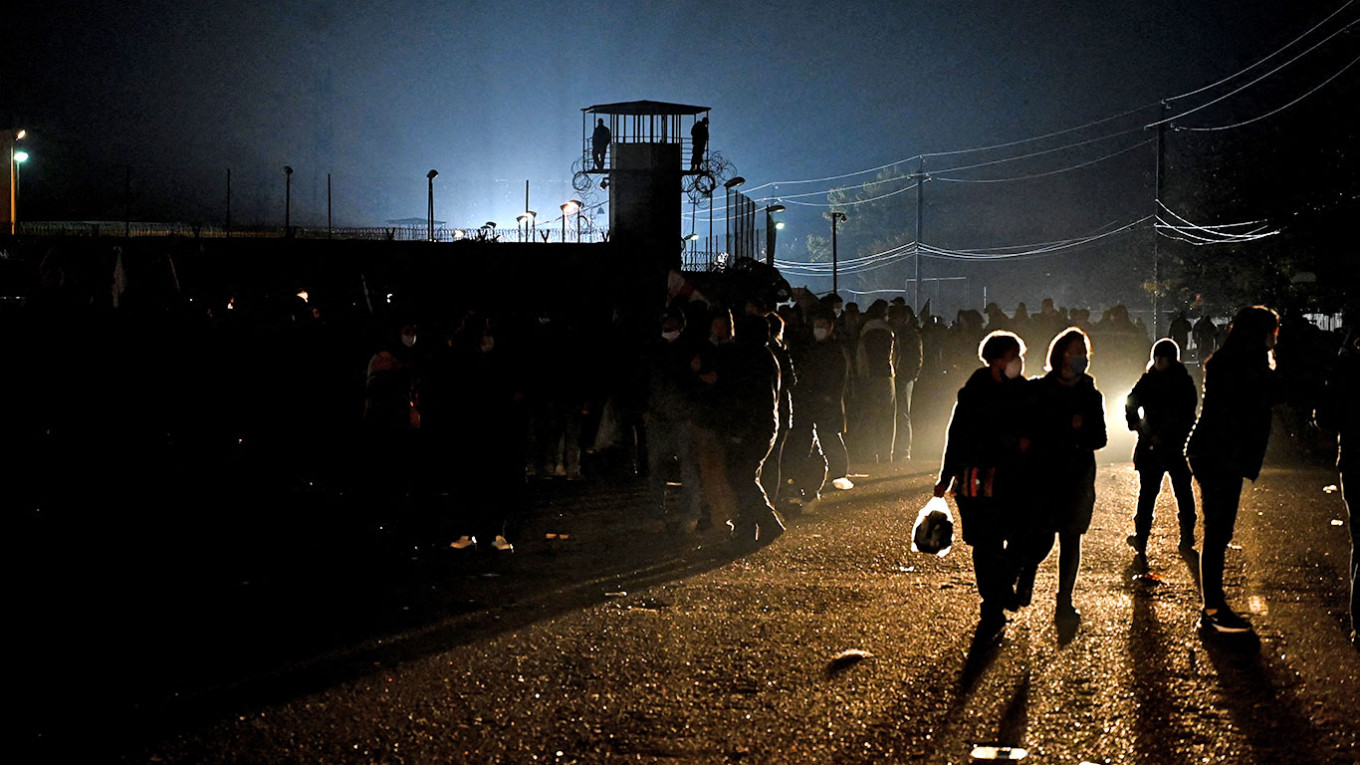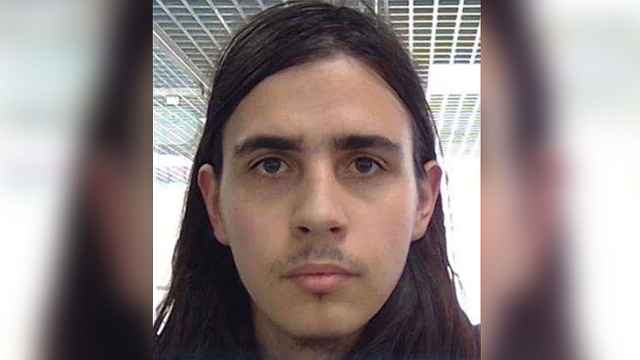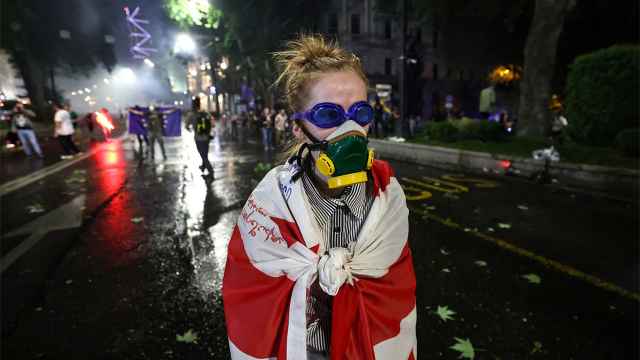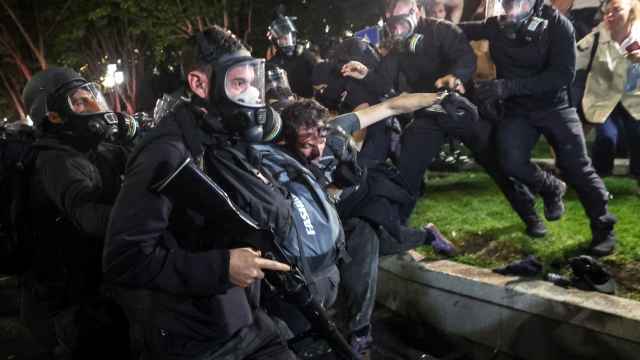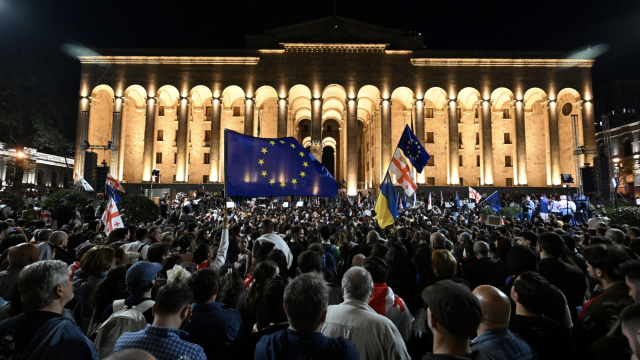Georgia's jailed ex-president and opposition leader Mikheil Saakashvili, who has been on hunger strike for weeks, said on Monday he feared for his life after prison guards assaulted him.
Saakashvili, who served as president between 2004 and 2013, was arrested on Oct. 1 on his return from exile in Ukraine.
He has refused food for 39 days to protest against his imprisonment, which he says is politically motivated.
His jailing has exacerbated a political crisis that erupted last year after the opposition denounced fraud in parliamentary elections won narrowly by the ruling Georgian Dream party.
The guards "abused me verbally, punched me on the neck, dragged me on the ground by my hair", Saakashvili said in a letter released through his lawyer, adding that his controversial transfer to a prison hospital was "aimed at killing" him.
He was moved on Monday to a prison hospital that rights officials say fails to ensure his proper treatment.
The flamboyant pro-Western reformer's arrest provoked the largest anti-government demonstrations in a decade.
Chanting Saakashvili's name, about 40,000 demonstrators flooded on Monday evening into the central Freedom Square in the Georgian capital Tbilisi, AFP reporters saw.
"A mass, permanent protest movement begins in Georgia and will not stop until Mikheil Saakashvili is set free and snap elections are called," Nika Melia, the chairman of Saakashvili's United National Movement party, told the crowd.
"We will not disperse, our protest will be relentless and peaceful, we will not let the regime provoke us to a civil confrontation."
Protesters then marched through downtown Tbilisi towards the prime minister's office, vowing to blockade the building.
Prime Minister Irakli "Garibashvili will not be able to leave or enter his office," Melia said.
One of the demonstrators, businessman Niko Mgeladze, 46, said: "Saakashvili is a victim of political vendetta, we will not stop until he is liberated."
Ukraine's protest
The pro-opposition Mtavari TV station aired footage of hundreds of riot police being deployed outside government buildings.
On Monday morning, doctors who examined Saakashvili said he was "at high risk of multi-systemic complications and needs to be urgently treated in a high-tech clinic."
Georgia's rights ombudswoman Nino Lomjaria said the prison hospital failed to meet the doctors' criteria.
Doctors have said Saakashvili faces an imminent risk of death as he has an underlying blood disorder that makes his hunger strike particularly dangerous.
Ukraine protested against Saakashvili's transfer to a prison hospital, saying the move "creates additional risks."
"We call on the Georgian side to transfer Mikheil Saakashvili to a civilian medical facility without delay," the foreign ministry said in a note of protest sent to Tbilisi.
Saakashvili, who was stripped of his Georgian passport in 2015, is now a national of Ukraine, where he headed — until his arrest — a government agency steering reforms.
'Right to suicide'
Saakashvili's lawyers have expressed concerns that his "security will not be guaranteed in the prison hospital where convicted criminals are employed as paramedics."
The independent Pirveli TV channel reported that inmates in the prison hospital staged a noisy protest against Saakashvili, shouting profanities at the man who led a relentless campaign against organized crime during his tenure as president.
Lomjaria, who visited Saakashvili in custody, said he was moved to a prison hospital against his will and was misled that he was to be transferred to a civilian clinic.
Prime Minister Irakli Garibashvili sparked an uproar recently by saying that Saakashvili "has the right to commit suicide" and that the government had been forced to arrest him because he refused to quit politics.
A Message from The Moscow Times:
Dear readers,
We are facing unprecedented challenges. Russia's Prosecutor General's Office has designated The Moscow Times as an "undesirable" organization, criminalizing our work and putting our staff at risk of prosecution. This follows our earlier unjust labeling as a "foreign agent."
These actions are direct attempts to silence independent journalism in Russia. The authorities claim our work "discredits the decisions of the Russian leadership." We see things differently: we strive to provide accurate, unbiased reporting on Russia.
We, the journalists of The Moscow Times, refuse to be silenced. But to continue our work, we need your help.
Your support, no matter how small, makes a world of difference. If you can, please support us monthly starting from just $2. It's quick to set up, and every contribution makes a significant impact.
By supporting The Moscow Times, you're defending open, independent journalism in the face of repression. Thank you for standing with us.
Remind me later.


